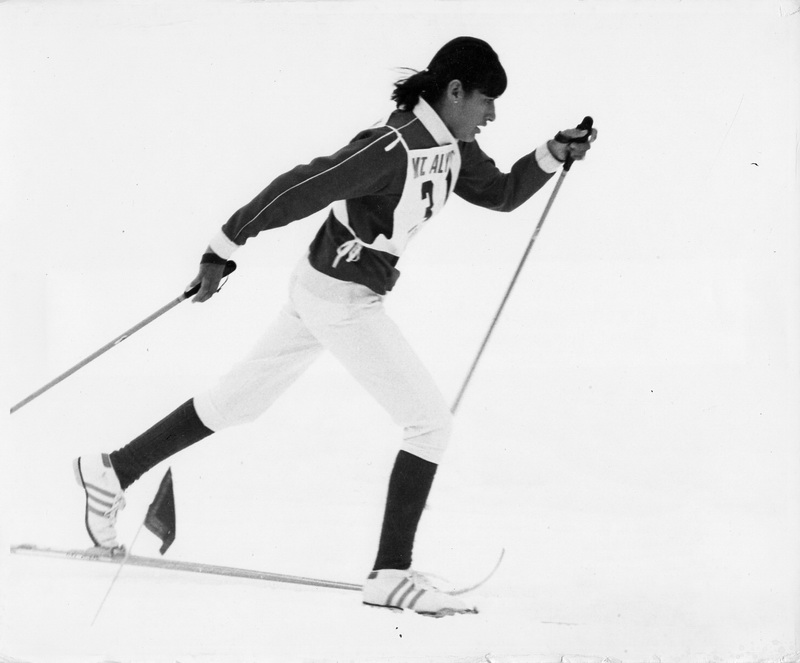
“The legacy of the Firth sisters could be a shadow. It could be something that was very interesting, very glorious, but right now, I think people tend to forget and move to something else.” – Father Mouchet
***
(Editor’s note: The following was written by Pavlina Sudrich, provincial head coach of the Ontario Ski Team and native of Whitehorse, Yukon. Sudrich was a product of the Territorial Experimental Ski Program (TEST) and directly impacted by the organization’s founding members, including the Firth twins. One of the sisters, Shirley Firth, died Tuesday at home in Yellowknife at the age of 59 after being diagnosed with cancer a year an a half ago. Originally published on Sudrich’s blog, this is a tribute to her.)

On April 30th Canada lost Shirley Firth, one of its most impressive, formidable ski legends.
Cross-country skiers born and raised in the North West Territories, Shirley and her twin sister Sharon were as legendary as the Gold Rush itself. Their success on the national and international ski scene were unprecedented, the likes of which Canada would not see again for generations.
Between 1968 and 1984 these two aboriginal women from the Mackenzie Delta achieved unprecedented success in cross-country skiing. For 16 years, the Firth sisters smashed Canadian sport records and dominated the ski scene, both domestically and overseas.
The Firth sisters, Shirley and Sharon, were born in Aklavik North West Territories in the winter of 1953. Six years later their family was relocated by the federal government to the newly fabricated town of Inuvik several kilometers east. It was there in Inuvik that the Firth sisters entered adolescence, twin sisters in a family of 14. As part of a typical childhood in those days the Firth sisters learned to hunt with their father, a Loucheaux-Metis, and trap with their mother, a Gwich’in from the region.
There are conflicting reports as to the exact year the Firth sisters were introduced to cross-country skiing, but by all accounts their introduction to the sport came by a man named Jean-Marie Mouchet. Father Mouchet was a Catholic Oblate from France. A missionary priest, he immigrated to Canada after the second world war, in which he patrolled the French-Italian border on skis. After spending time in small northern communities such as Telegraph Creek and Old Crow, Mouchet was posted to Inuvik.
It was in the tenacity of the northern first nation’s people that Father Mouchet saw athletic potential. Recalling it later, he says: “They were trappers, they were hunters. They were living in the very cold climate doing ordinary work, like cutting and packing wood and going down to the river to bring water up. It gave them the right components.”
It was in Inuvik that Father Mouchet founded the Territorial Experimental Ski Program (TEST). He received support from the federal government which at the time was trying to develop amateur sport in Canada as well as support the social development of Canadian First Nations. He received skis from the US Air Force in Alaska was given a big warehouse in Inuvik from which to run the operations.

It was through the TEST program that the Firth sisters received their first pair of skis. As members of TEST, the sisters spent many long hours training in the bleak darkness of the winter and under the midnight sun of the summer. It was during this time that Norwegian coach Bjorger Petterson began working with the sisters. It was a coaching relationship that would last many years.
Not long after they began skiing, the Firth sisters attended their first major race in Anchorage, Alaska. Even now several decades later, Father Mouchet recounts the events fondly: “I happened to be in Alaska when they won that championship. People were surprised. Those skinny girls, they were quite dark. You know how the Americans are, they are quite arrogant, they think they are on top of the world. To see those skinny girls being able to beat them flat out, you know,” he said with a laugh.
Their victory in Anchorage (in which Shirley won) was one of many the sisters would enjoy over the years. Together with several other athletes from Inuvik and with Petterson as their coach the Firth sisters went on to compete all over Canada and Europe. The sisters won a total of won 48 Canadian championships and in 1972 they competed in their first Olympics in Sapporo, Japan. By that time Canada’s national cross-country team was dominated by first nation’s athletes from around Inuvik. The sisters went on to compete in four consecutive Olympic Games between 1972 and 1984 and were the first Canadian women to do so.
In recalling their achievements Father Mouchet says, “At first it was not easy for them because they did not see their potential. They were not used to discipline, but they grew out of that. They became very active in cross-country skiing because they started to realize it was the tool for them to penetrate the white man’s world.”
The Firth sisters have admitted that skiing opened many doors to them that might have otherwise remained shut. As Sharon once recounted: “(Petterson) said that if we do well we’d travel the world and as a child that was one of my dreams. In school I used to sit by the window and wonder ‘What it was like out there? Will I ever see this world? Will I just stay here in the north.’”
Not only did the Firth sisters manage to tour the world throughout their career, they also managed to make a distinct impression on the people who witnessed them race. Fellow teammate Bert Bulloch remembers, “They were a household name. Across the country, they didn’t come to see me, or anyone else — they came to see the twins.”
The impact of the Firth sisters historic achievements resonated deeply with everyone who knew their story. I have the distinction of being one of the last athletes the TEST program ever produced. As a young woman who grew up racing in the Yukon, Shirley and Sharon’s experience proved to me there was no excuse, no barrier, no perceived disadvantage too great when you are driven by passion and the pursuit of excellence. It was with great sadness that I heard Shirley had passed away at the age of 59. The legacy of her achievement, the medals, the records she broke and still hold, are an amazing testament of a true Canadian ground breaker and icon. Thank you Shirley.
****



